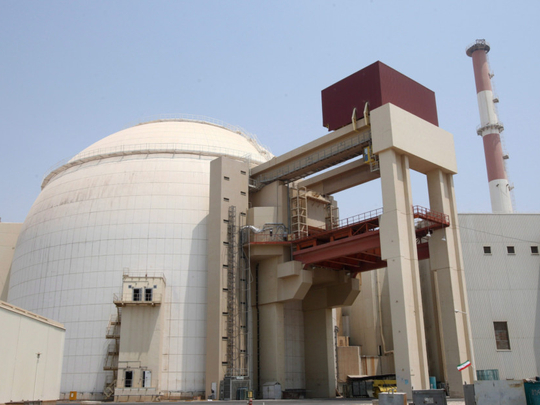
Stunning and important protests in Iran have rightly dominated the headlines in recent days, but another consequential moment is fast approaching for Iran and the West. It must not be overlooked in the excitement and concern for Iranian citizens bravely standing up for their rights.
Since President Donald Trump’s decision in October not to certify the Iran nuclear deal, Britain, France and Germany have sent a steady stream of emissaries to Washington to press the administration to delay or water down efforts to fix what it sees as a flawed agreement. There is a much more constructive way forward, however — if the Europeans can grab onto it before it evaporates.
The Iran deal suffers from inadequate verification and, most problematically, “sunset” clauses that allow Tehran to start rebuilding its nuclear-weapons capability. Left unchecked, in about a decade Iran will be closer to producing enough nuclear fuel for a bomb — a “breakout capability” — than it was before the agreement was finalised in 2015. The Europeans recognise the danger of allowing the sunset clauses to stand, yet they haven’t offered any serious solutions. They are, however, rebuilding business with the Islamic republic.
Although the nuclear deal placed restrictions on Tehran’s gas centrifuge uranium-enrichment programme, the regime will be allowed in just six years to ramp up the centrifuge manufacturing process essential for the production of thousands of advanced centrifuges. Also in six years, the United Nations plans to remove all nuclear-related sanctions on Iran. As a party to the nuclear agreement, Washington would allow Iran to import what it needed for industrial-scale centrifuge production, which, over successive years, would shrink the time required to make fuel for a bomb to just days.
Meanwhile, the regime’s long-range missile programme continues to advance — steadily progressing towards the ability to field intercontinental ballistic missiles designed specifically to carry nuclear warheads.
European officials like to stress that when the sunsets end, Iran would still be a member of the Nuclear Non-Proliferation Treaty and subject to its Additional Protocol. If these were enough by themselves, however, there would have been no need for the 2015 nuclear agreement. Given the aggressive and expansionist nature of the Iranian regime, only the naive or disingenuous would settle for these two conditions.
Time isn’t a friend. It took nearly 15 years to achieve the nuclear accord — known as the Joint Comprehensive Plan of Action — after the discovery of Iran’s once-covert nuclear programme in 2002. The United States and Europe must start building a common approach to prevent the nuclear crisis that the JCPOA has only temporarily delayed.
Although developing a common position on stopping Tehran’s nuclear build-up will take months, agreeing to start is urgent. By mid-January, Trump must decide whether he wants to continue waiving US nuclear sanctions on Iran and remain in the deal. When the president announced his non-certification decision in October, he called on Congress and the Europeans to work with him to fix the agreement. If the Europeans refuse, then the onus falls on Congress and the administration to create a new US policy toward the JCPOA.
However, European visitors to Washington have expressed opposition to draft congressional legislation that would state, as a matter of law, that the United States will not accept any growth in Iran’s uranium enrichment or weapons-usable plutonium production that would reduce breakout time to less than 12 months. The intention is to put down an enforceable red line: Rather than violating these US restrictions and face the snapback of nuclear sanctions, Iran could voluntarily delay plans to expand its centrifuge production, as outlined in its long-term enrichment plan, which is a subsidiary of the JCPOA.
US Senators Bob Corker (Republican, from Tennessee) and Tom Cotton (Republican, from Arkansas), who developed the initial legislation in consultation with the White House, have been discussing the path forward with Senator Benjamin Cardin (Democrat, from Maryland). They seek to create a bipartisan Iran nuclear policy — something US President Barack Obama notably failed to do. The legislation is intended to provide markers for restricting the growth of the Islamic republic’s atomic programme where the JCPOA allows expansion. Passage would provide the impetus now lacking for all parties to conclude a better agreement or an alternative plan before Iran’s dangerous build-up commences.
With European officials expressing opposition to the legislation, Democrats have hesitated. Europe can help by supporting, or otherwise not impeding, passage of the US draft legislation. It should sit down with the Trump administration to design common positions on preventing the nuclear sunsets, improving enforcement of the agreement and dealing with Iran’s long-range ballistic missiles.
Cherry-picking missiles or enforcement is not enough; fixing the sunsets is fundamental. The alternative is that Trump may decide this month not to waive US nuclear sanctions, effectively withdrawing the US from the JCPOA. Or he could implement his new Iran policy by an executive order that would likely be far tougher than one developed in concert with European allies and Congress.
Time is short. The Europeans and many Democrats are well aware of the nuclear accord’s grave deficiencies. They have a chance to sculpt a bipartisan policy that can save us from the next crisis, which is quickly coming our way.
— Washington Post
David Albright is president and founder of the Institute for Science and International Security. Andrea Stricker is a senior policy analyst at the institute.








